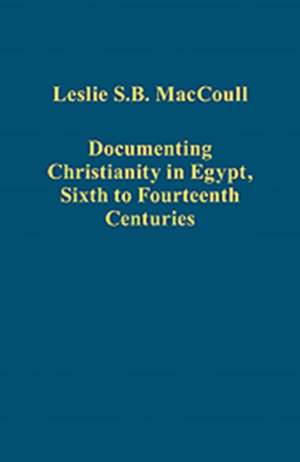Documenting Christianity in Egypt, Sixth to Fourteenth Centuries: Variorum Collected Studies
Autor Leslie S.B. MacCoullen Limba Engleză Hardback – 2 sep 2011
Din seria Variorum Collected Studies
- 9%
 Preț: 938.85 lei
Preț: 938.85 lei -
 Preț: 311.41 lei
Preț: 311.41 lei -
 Preț: 351.48 lei
Preț: 351.48 lei -
 Preț: 313.38 lei
Preț: 313.38 lei -
 Preț: 386.77 lei
Preț: 386.77 lei -
 Preț: 325.68 lei
Preț: 325.68 lei -
 Preț: 396.00 lei
Preț: 396.00 lei -
 Preț: 312.75 lei
Preț: 312.75 lei - 9%
 Preț: 1041.23 lei
Preț: 1041.23 lei -
 Preț: 258.66 lei
Preț: 258.66 lei -
 Preț: 299.55 lei
Preț: 299.55 lei - 9%
 Preț: 938.08 lei
Preț: 938.08 lei -
 Preț: 343.33 lei
Preț: 343.33 lei -
 Preț: 311.18 lei
Preț: 311.18 lei - 9%
 Preț: 937.13 lei
Preț: 937.13 lei -
 Preț: 351.41 lei
Preț: 351.41 lei -
 Preț: 320.00 lei
Preț: 320.00 lei - 34%
 Preț: 764.20 lei
Preț: 764.20 lei - 23%
 Preț: 315.48 lei
Preț: 315.48 lei - 36%
 Preț: 740.06 lei
Preț: 740.06 lei - 34%
 Preț: 764.20 lei
Preț: 764.20 lei - 34%
 Preț: 680.73 lei
Preț: 680.73 lei - 26%
 Preț: 247.40 lei
Preț: 247.40 lei - 34%
 Preț: 485.78 lei
Preț: 485.78 lei - 38%
 Preț: 766.91 lei
Preț: 766.91 lei - 34%
 Preț: 767.07 lei
Preț: 767.07 lei - 34%
 Preț: 764.20 lei
Preț: 764.20 lei - 34%
 Preț: 769.51 lei
Preț: 769.51 lei - 38%
 Preț: 769.85 lei
Preț: 769.85 lei - 34%
 Preț: 826.68 lei
Preț: 826.68 lei - 25%
 Preț: 225.28 lei
Preț: 225.28 lei - 25%
 Preț: 225.54 lei
Preț: 225.54 lei - 34%
 Preț: 736.38 lei
Preț: 736.38 lei - 34%
 Preț: 738.43 lei
Preț: 738.43 lei - 25%
 Preț: 226.52 lei
Preț: 226.52 lei - 33%
 Preț: 491.66 lei
Preț: 491.66 lei - 34%
 Preț: 485.78 lei
Preț: 485.78 lei - 34%
 Preț: 485.78 lei
Preț: 485.78 lei - 36%
 Preț: 739.17 lei
Preț: 739.17 lei - 38%
 Preț: 766.34 lei
Preț: 766.34 lei - 31%
 Preț: 473.94 lei
Preț: 473.94 lei - 18%
 Preț: 843.61 lei
Preț: 843.61 lei - 38%
 Preț: 774.91 lei
Preț: 774.91 lei - 38%
 Preț: 769.92 lei
Preț: 769.92 lei - 34%
 Preț: 764.20 lei
Preț: 764.20 lei - 51%
 Preț: 485.78 lei
Preț: 485.78 lei - 36%
 Preț: 488.49 lei
Preț: 488.49 lei - 34%
 Preț: 769.10 lei
Preț: 769.10 lei - 38%
 Preț: 766.99 lei
Preț: 766.99 lei - 18%
 Preț: 1019.01 lei
Preț: 1019.01 lei
Preț: 247.45 lei
Preț vechi: 326.92 lei
-24% Nou
Puncte Express: 371
Preț estimativ în valută:
47.35€ • 49.57$ • 39.18£
47.35€ • 49.57$ • 39.18£
Comandă specială
Livrare economică 17-31 martie
Doresc să fiu notificat când acest titlu va fi disponibil:
Se trimite...
Preluare comenzi: 021 569.72.76
Specificații
ISBN-13: 9781409427889
ISBN-10: 1409427889
Pagini: 350
Dimensiuni: 152 x 224 mm
Greutate: 0.76 kg
Ediția:1
Editura: Taylor & Francis
Colecția Routledge
Seria Variorum Collected Studies
Locul publicării:Oxford, United Kingdom
ISBN-10: 1409427889
Pagini: 350
Dimensiuni: 152 x 224 mm
Greutate: 0.76 kg
Ediția:1
Editura: Taylor & Francis
Colecția Routledge
Seria Variorum Collected Studies
Locul publicării:Oxford, United Kingdom
Cuprins
Contents: Introduction; Part I Papyri, Coptic and Greek: The Apa Apollos monastery of Pharoou (Aphrodito) and its papyrus archive,; Further notes on interrelated Greek and Coptic documents of the 6th and 7th centuries; Dated and datable Coptic documentary hands before AD 700; Why do we have Coptic documentary papyri before AD 641?; More on documentary Coptic at Aphrodito; P. Lond.Copt. I 1077: taxes in money in 7th-century Egypt; Aspects of Church finance in the 7th-century Hermopolite according to P.Lond.Copt.I 1077; The Bawit contracts: texts and translations. Part II John Philoponus: A new look at the career of John Philoponus; The monophysite angelology of John Philoponus; John Philoponus and the composite nature of Christ; John Philoponus On the Pasch (CPG 7267): the Egyptian eucharist in the 6th century and the Armenian connection; The historical context of John Philoponus' De Opificio Mundi in the culture of Byzantine-Coptic Egypt. Part III Cultural Studies: Late Antiquity and After: Uniformis Trinitas: once more the theopaschite trinitarianism of Discorus of Aphridito; The Anaximander saying in its 6th-century (CE) context; 'A dwelling place of Christ, a healing place of knowledge': the non-Chalcedonian eucharist in late antique Egypt and its setting; The prophecy of Charour; Coptic wisdom poetry: the Solomon complex redux; The rite of the jar: apostasy and reconciliation in the medieval Coptic Orthodox Church; Index.
Notă biografică
Leslie S.B. MacCoull, Society for Coptic Archaeology (North America)
Recenzii
'This is the second volume by MacCoull to appear in the Variorum Collected Studies Series after the one on Coptic Perspectives on Late Antiquity. The present volue covers a broader period and many more aspects than the purely Coptic. It also shows the breadth of the author’s interests and expertise.' Journal of Eastern Christian Studies
Descriere
These studies cover three areas in Christian Egypt's long and enduring history. The first deal with record-keeping in Coptic and Greek, showing how these languages were used to embody everyday transactions and messages. Then come five studies of the major sixth-century thinker, John Philoponus, who contributed to the self-definition of the non-Chalcedonian Egyptian church and employed both classical philosophy and biblical exegesis, providing fellow Miaphysites with needed intellectual tools. Finally, six articles ranging from sixth-century philosophy, poetry, and liturgy to the cultural productions of Egyptian Christians living under Muslim rule, examine how they sought to memorialize traditions and deal with internal conflict.
